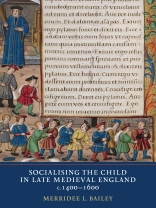An investigation into a variety of texts providing guidance for teachers, parents, and children themselves.
The question and procedures of integrating children into wider society during the medieval and early modern period are debated across a wide range of contemporary texts, in both print and manuscript form. This study takes as its focus the ways in which vernacular literature (including English courtesy poems, incunabula and sixteenth-century printed household books, grammar school statutes, and pedagogic books) provided a guide to socialising children. Theauthor examines how the transmission and reception of this literature, showing how patterns of thought changed during the period for parents, teachers, and young people alike; and places children and family reading networks into the context of debates on the history of childhood, and the history of the book.
Merridee L. Bailey is a social and cultural historian of late medieval and early modern England. She is an Associate Member of the Facultyof History, University of Oxford.
Tabela de Conteúdo
Introduction
Courtesy Poems
Readers
Virtue and Vice
Sixteenth-Century Books
The School
Conclusion
Appendix A: English Vernacular Courtesy Poems
Appendix B: Incunabula
Appendix C: Sixteenth-Century Books
Appendix D: Educational Sources
Bibliography
Index












